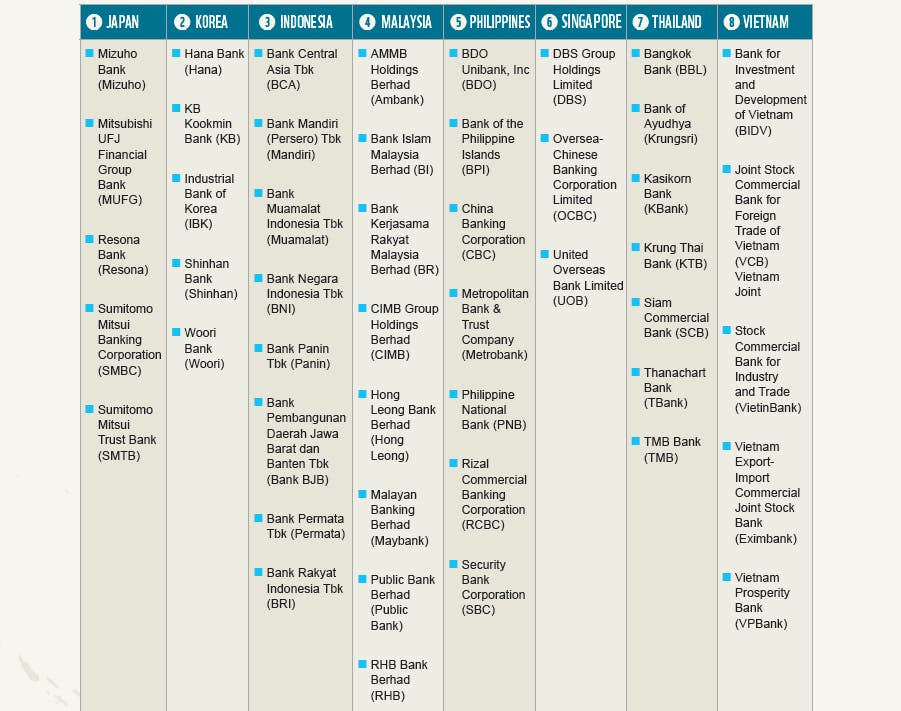Two-thirds of Southeast Asian banks do not recognise deforestation and biodiversity risks although more than half of the world’s GDP—$44 trillion of economic value generation—is moderately or highly dependent on nature and its services, a study by World Wide Fund for Nature (WWF) has revealed.
To continue reading, subscribe to Eco‑Business.
There's something for everyone. We offer a range of subscription plans.
- Access our stories and receive our Insights Weekly newsletter with the free EB Member plan.
- Unlock unlimited access to our content and archive with EB Circle.
- Publish your content with EB Premium.
In its fourth Sustainable Banking Assessment (SUSBA), WWF found that while banks have made progress in integrating environmental and social considerations into their financial activities, there are large gaps that leave their portfolios vulnerable to risks arising from climate change and nature loss.
This year’s assessment included five Japanese and five South Korean banks on top of 38 Southeast Asian banks, as banks from the two countries play a significant role in financing businesses in the region.
But out of all 48 banks, only three Singaporean banks—DBS, OCBC and UOB—require high-risk clients to have no-deforestation commitments. While all five Japanese banks and one Korean bank recognise deforestation risks, none have made similar commitments to eradicating deforestation in their portfolios.
Worse still, while three quarters have made some improvement, only eight banks fulfilled more than half of the 70 indicators.

A list of the 48 banks in Asean, Japan, Korea included in the SUSBA report by WWF.
The assessment is based on a framework covering six aspects of environmental, social and governance (ESG) integration: purpose, policies, processes, people, products and portfolio. This year’s assessment also includes a new sector-specific analysis, covering palm oil and energy policies.
“Banks have an important role to play; just as they help businesses recover from the pandemic, they are pivotal to navigating the climate and nature emergencies. This crisis has shown that society is more exposed to nature risk than ever, but with the right corrective actions, we can emerge stronger and more resilient,” said Keith Lee, WWF’s senior vice president of Asia sustainable finance, in a statement.
In addition to nature, coal—the world’s dirtiest fossil fuel—poses another risk for banks. The latest science recommends a need to phase out coal globally by 2040 in order to meet the commitments made in the Paris agreement, which means that existing coal plants will need to be closed.
But of the 48 banks assessed, only one Korean and three Singaporean banks prohibit the financing of coal-fired power plants without exception. While all five Japanese banks have a no-coal policy, they have exceptions for certain types of technology or carbon capture.
Not included in the report, Malaysia’s CIMB unveiled a comprehensive climate policy in December 2020 that rules out any exposure to coal power by 2040, surpassing the pledges made by the other banks.
In comparison, data from the Institute for Energy Economics and Financial Analysis (IEEFA) shows that more than 150 major global financial institutions now have coal exit policies in place, with 65 banks committing to tighter lending guidelines in 2020 alone.
Banks that continue to finance coal are exposed to climate-related transition risks such as carbon taxes and technological obsolescence, the WWF report warned.
Japanese banks leading the charge
The report also found that Japanese banks outdid banks in Southeast Asia and South Korea for their efforts towards sustainable finance.
Japanese banks tended to score well on climate-related criteria as all five banks assessed explicitly disclosed in line with the Task Force on Climate-related Financial Disclosures (TCFD) recommendations of climate-related governance strategy, risk management, and metrics and targets.
In addition, Japanese banks not only offered green finance products and had targets to increase such financing, but also supported clients more proactively with consulting services or awareness-raising activities.
All five Japanese banks had climate strategies, compared to 24 per cent of Asean banks and three out of five Korean banks. Four of out five Japanese banks took the next step to perform climate scenario analysis and disclose the results.
Although Japanese banks are leading the pack, there is a further need for transparency and disclosures around specific policies that they have for lending to companies in sensitive sectors, and around the processes in which they are integrating climate-related risks into their overall risk management and decision-making process, said Lee.
Water stewardship and science-based targets lacking
Based on the report, no bank in Southeast Asia, Japan or Korea requires its clients to commit to water stewardship or develop a plan to align their businesses with the Paris Agreement objectives.
Only one Korean bank—Shinhan Bank—out of all the Asian banks assessed, has formally committed to setting science-based targets under the Science-Based Targets Initiative (SBTi).
As expectations from regulators and investors continue to increase, banks should adopt a more strategic approach by setting science-based targets to decarbonise their portfolios, the report recommends.
Among other recommendations, the report highlights the need for banks to formulate and strengthen climate-related and natural capital risk strategies for the entire portfolio, provide mandatory training on environmental, social and governance (ESG) issues at all levels, and develop sector-specific policies.










